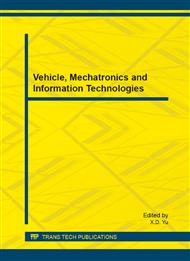p.2152
p.2157
p.2161
p.2165
p.2169
p.2173
p.2177
p.2183
p.2187
Research on Load Simulator Based on CMAC Neural Network
Abstract:
A novel parallel control strategy based on the CMAC controller and PID control is proposed which is to solve the problem of extraneous torque which exists in the load simulator. In which, the CMAC controller realizes feed forward control, yet conventional PID controller only realizes feedback control, and using the PD algorithm improves system. The simulation results show that output of the conventional PID controller completes unceasing on-line learning by the CMAC neural network. Effectively suppress the extra torque of the load simulator, the Load Simulator system performance has been improved significantly.
Info:
Periodical:
Pages:
2169-2172
Citation:
Online since:
August 2013
Authors:
Keywords:
Price:
Сopyright:
© 2013 Trans Tech Publications Ltd. All Rights Reserved
Share:
Citation:


